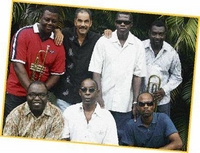Performers' sales 'show' up distribution
Published: Sunday | December 20, 2009

Members of the Fab Five Band (from left back row): Andre Palmer (trumpeter), Franklyn Campbell (bassist and manager), Sidney Thorpe (keyboard player), Romeo Gray (trambonist). In the front row are Donovan Palmer (keyboard player), Asley 'Grub' Cooper (drummer, lead vocalist, musical arranger) and Glenroy Samuels (guitarist). - Contributed
The Fabulous Five Incorporated Band's four-edition live CD series is a mini-study in the development of CD-selling strategy over the past decade.
Frankie Campbell, the band's bassist/manager, tells The Sunday Gleaner that part one of 'Fab Five Live' was released in 1999 and copies given to radio stations, KOOL FM and Radio 2 among those giving good support. When part two came out in 2002/2003, he says "things were beginning to change. Radio was not playing much except dancehall."
So 'Fab Five Live' parts three and four, the last released two years ago and coinciding with a box set of the series, were not even given to the radio stations for, hopefully, airplay. Instead, Fab Five pushed the CDs at their live concerts and, in a turnaround of the accustomed flow of business relations, distributors VP Records are now buying the CDs from the band and distributing it.
This is against the background of dismal CD sales figures reported recently in The Sunday Gleaner, dated November 15, 2009.
It was reportedly not a good year for Jamaican pop music as sales tracker, SoundScan, reported that music buyers in the United States showed little interest in what Jamaican artistes had to offer in 2009.
SoundScan released sales figures to the end of October showing that collectively, reggae/dancehall music sold just 502,171 units for the first 10 months of the year.
Leading the way was Sean Paul's Imperial Blaze album with sales of 70,917, a massive drop from sales of The Trinity, his previous album, which sold over three million copies.
electronic network
SoundScan is an electronic network that collects sales data from over 17,000 record stores in the United States. Its data is widely used by publications, such as Billboard magazine.
In addition, some of the acts VP Records had banked on this year folded. Chief among them was singer Tarrus Riley and deejay Mavado whose Contagious and Mr Brooks: A Better Tomorrow had dismal returns at 4,736 and 14,000, respectively.
"You will never see Fab Five's figures, because our sales are on the road. When you look at them Fab Five does better," Campbell said. "The mainstream is not doing so well at all."
It is not exactly the 'one-one-coco-full-basket' approach, but the brisk sales Fab Five enjoys at their concerts do add up, Campbell saying that they sold 350 copies of their CDs at a park concert in Toronto, Canada. And the sales tactic is not exactly new, as Campbell says "we have been doing it for years".
"Being on the road quite a lot, when you add it up you get a couple thousand," he said. And people who have seen their sales contract like wet leather in the hot sunlight from five years ago, have seen the light and "they are now doing what we were doing", Campbell says.
good album with good voices
So, last Sunday evening, as Drs Leonard Miler and Richard Kirkwood presented their Travelling Companion double CD to the public officially, Campbell was qualified to give them advice about how to get the product heard - and sold. "The advice I am giving to them is that they must go out and play the music for families and friends," Campbell said.
Eventually, he said, persons working on radio stations did ask for the live CDs and "we felt good". Importantly, as those persons had asked for the CD, "those who got it played it". Campbell pointed out that it is hard for a radio disc jock to sort through all the CDs that he or she gets, including substandard recordings, to determine which records to play.
"They (Miller and Kirkwood) can eventually sell off the stock. It is such a good album with good voices," Campbell said. Among those voices is that of the late Trevor Rhone.
Campbell points out that people over 35 years old do not wish to download ("they can't bother to walk around with an iPod in their ears") and they also want the physical CD with the liner notes. "The music is important, but they want something to show," he said.



















